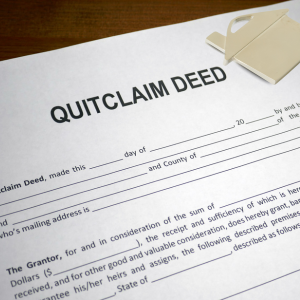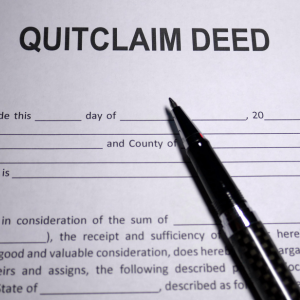
Understanding Quitclaim Deeds: Key Concepts and Legal Implications
Understanding quitclaim deeds is crucial for homeowners in Springfield, MA, looking to sell their property. A quitclaim deed is a legal document that transfers ownership of real estate without making any warranties about the title’s validity or encumbrances.
This type of deed is commonly used among family members or parties who have a trusting relationship, as it offers minimal protection to the buyer. When using a quitclaim deed to sell a house in Springfield, it’s important to be aware of its implications; while it facilitates quick and straightforward property transfers, it does not guarantee that the title is free from defects or claims by others.
Homeowners should ensure they understand the potential risks and consult legal professionals to navigate any complexities associated with these transactions. The process involves legally preparing the deed, which must include accurate details about the property and be signed by both parties involved in front of a notary public before being recorded at the Hampden County Registry of Deeds.
For expert assistance throughout this process, Naples Home Buyers in Springfield can help ensure everything is handled correctly and efficiently. Understanding these key concepts helps sellers make informed decisions when considering a quitclaim deed for their real estate transactions.
Evaluating the Risks of Selling Your Home with a Quitclaim Deed

When considering selling a house in Springfield, MA, using a quitclaim deed, it’s crucial for homeowners to thoroughly evaluate the potential risks involved. A quitclaim deed is a legal instrument often used to transfer property ownership without making guarantees about the title’s status.
This means that as a seller, you are transferring your interest in the property, if any, without providing any warranties against existing liens or claims. In Springfield’s real estate market, this could pose significant risks because the buyer receives no assurance regarding clear ownership.
Homeowners must be aware that unresolved issues like unpaid taxes or outstanding mortgages might still encumber the title. Furthermore, since quitclaim deeds do not require title insurance or extensive due diligence during the transaction process, buyers may perceive increased risk and potentially offer less for your home.
For a faster and simpler alternative, consider working with cash home buyers in Springfield and nearby cities who are experienced in handling unconventional property sales and can help streamline the process without the hassle of traditional buyer concerns. Therefore, sellers should consider these factors carefully and consult a real estate attorney familiar with Massachusetts property laws to ensure they understand all implications before proceeding with this method of property transfer.
Step-by-Step Process to Complete a Quitclaim Deed in Springfield, MA
When selling a house in Springfield, MA, using a quitclaim deed, it’s crucial to follow a detailed step-by-step process to ensure a smooth transaction. First, obtain the correct quitclaim deed form specific to Massachusetts, which can be found at the Hampden County Registry of Deeds or through an attorney.
Fill out the form accurately, ensuring all property details and parties involved are correctly listed. Both the grantor and grantee must provide their full legal names and addresses.
It’s essential for the grantor to clearly state that they are transferring all their ownership interest in the property without warranties. The deed must then be signed by the grantor in front of a notary public to authenticate the document legally.
After notarization, submit the completed quitclaim deed to the Hampden County Registry of Deeds for recording, accompanied by any applicable filing fees. Recording the deed is vital as it publicly documents the transfer of ownership, providing legal protection for both parties involved in the sale.
It is advisable for homeowners to consult with a real estate attorney throughout this process to address any questions and ensure compliance with local regulations.
How to Transfer Property Ownership with a Quitclaim Deed in Massachusetts

Transferring property ownership in Springfield, MA, using a quitclaim deed involves several key steps that homeowners should understand. A quitclaim deed is a legal document used to transfer interest in real estate from one party to another, often without the guarantees that come with other types of deeds.
In Massachusetts, the process begins by preparing the quitclaim deed, which must include specific information such as the names of the grantor and grantee, a clear description of the property, and any relevant addresses. It’s crucial to ensure accuracy and completeness in this document to avoid potential legal issues.
Once prepared, both parties must sign the deed in front of a notary public to authenticate their identities and intentions. After notarization, it’s important to file the executed quitclaim deed with the Hampden County Registry of Deeds if your property is located in Springfield.
This step officially records the change in ownership and makes it part of the public record. Homeowners should also verify that all outstanding liens or mortgages on the property are addressed before completing the transaction, as these could complicate or invalidate the transfer.
Engaging with a real estate attorney can be beneficial for ensuring compliance with Massachusetts law throughout this process.
Selling Property with a Quitclaim Deed in Massachusetts: A Comprehensive Guide
Selling property using a quitclaim deed in Massachusetts, particularly in Springfield, requires understanding the specific nuances of this legal instrument. A quitclaim deed transfers ownership rights without guaranteeing the title’s validity, which means that any existing claims or liens remain unresolved.
This method is often used among family members or to clear up title issues due to its straightforward nature. When selling a house in Springfield, MA, with a quitclaim deed, homeowners should first ensure that both parties are aware of the potential risks involved.
It is essential to conduct a thorough title search before proceeding to avoid future disputes. Consulting with a real estate attorney familiar with Massachusetts property laws can help navigate this process more effectively.
Additionally, recording the deed at the Hampden County Registry of Deeds solidifies the transaction and updates public records accordingly. If you need assistance or have questions about using a quitclaim deed to sell your property, feel free to contact us for guidance tailored to your situation. Understanding local regulations and requirements will ensure a smoother transfer when selling property using a quitclaim deed in Springfield.
Tax Implications of Transferring Property via a Quitclaim Deed in Massachusetts

When transferring property in Springfield, MA, using a quitclaim deed, homeowners must be aware of the potential tax implications specific to Massachusetts. A quitclaim deed allows the homeowner to transfer their interest in the property without making guarantees about the title.
In Massachusetts, this transfer might trigger certain tax consequences, such as capital gains tax if the property has appreciated since purchase. It’s crucial to consider whether the transaction is a gift or sale, as gifting can have different federal and state tax implications compared to a sale.
Additionally, Massachusetts imposes an excise tax on real estate transactions, commonly known as a stamp duty or deed excise tax, which is calculated based on the property’s value at the time of transfer. Homeowners should consult with a tax professional or real estate attorney familiar with local laws to ensure compliance and proper handling of any taxable events associated with using a quitclaim deed for property transfers in Springfield.
Understanding these nuances can help homeowners avoid unexpected liabilities and ensure a smooth transition when selling their house through this method.
Can I Use a Quitclaim Deed to Sell My House?
Yes, you can use a quitclaim deed to sell your house in Springfield, MA, but it’s important to understand its implications. A quitclaim deed is often used when transferring property between family members or in situations where the title’s history is not in question.
Unlike a warranty deed, a quitclaim deed offers no guarantees about the property’s title; it simply transfers whatever interest the seller has to the buyer. If you’re considering selling your house using a quitclaim deed, it’s crucial for homeowners in Springfield to conduct a thorough title search to ensure there are no undisclosed liens or claims on the property.
While this method can expedite the transfer process, particularly when speed and simplicity are priorities, it might not be suitable for traditional real estate transactions where buyers expect clear title assurances. Consulting with a local real estate attorney familiar with Massachusetts property laws can help you navigate potential pitfalls and ensure that using a quitclaim deed aligns with your goals for selling your house in Springfield.
Does a Quitclaim Deed Give You Ownership in Massachusetts?
In Massachusetts, a quitclaim deed is a common legal instrument used in real estate transactions, but it’s essential to understand its implications regarding ownership. A quitclaim deed transfers the seller’s interest in the property to the buyer without any warranties or guarantees about the title’s condition.
In Springfield and throughout Massachusetts, using a quitclaim deed means that the grantor effectively relinquishes any claim they might have on the property, transferring whatever interest they possess to the grantee. However, it does not guarantee the grantor has valid ownership rights or that the title is free from encumbrances or liens.
For homeowners looking for a faster, more certain sale without the risks of title disputes, working with a company that buys homes in Massachusetts and surrounding cities can be a practical solution. These buyers are often more flexible in handling properties with title issues, offering cash purchases and quicker closings. Therefore, both sellers and buyers need to perform a thorough title search and consider obtaining title insurance to safeguard their interests when conducting real estate transactions involving quitclaim deeds in Massachusetts.
What Are the Problems with a Quitclaim Deed?
The initial stage, when setting out to sell a house in Springfield, MA, using a quitclaim deed, involves an in-depth understanding of the possible shortcomings of this particular approach. This type of deed is common when there is a transfer of property through family or where a considerable amount of trust exists, as it does not provide much protection to the buyer.
As we have noted, there are some critical aspects where the grantor does not provide a title or ownership guarantee, which can befall the new owner. Additionally, any already existing liens, encumbrances, obstructions, and defects of the title will still require a resolution and become the new owner’s problem. Not providing a warranty at all is risky, especially in Springfield, where issues with historical properties abound regarding the market’s complex title.
In addition, lenders are typically cautious when it comes to financing transactions involving quitclaim deeds because of the lack of warranty issues. For this reason, devoid of such financing, most people would need cash or alternative financial resources, which markedly reduces the pool of potential buyers willing to purchase the house.
Using a quitclaim deed tends to bring additional complications to disputes involving property lines or third-party claims, so homeowners should be cognizant of the risks. This is legal language aside; a quitclaim deed may appear to allow for uncomplicated and speedy property transfers in Springfield, MA. Homeowners need to understand the scope of the transaction, considering all implications, which may warrant consulting a real estate lawyer to seek advice before making these decisions.
In What Situations Can a Quitclaim Deed Not Be Used?
In Springfield, MA, a quitclaim deed and selling a house go together nicely, but understanding the prerequisites of using such a deed is equally important. A quitclaim deed cannot be utilized in situations where the seller must guarantee the absence of any liens or a clear title for ownership claim disputes.
Everywhere else and in Springfield, this legal document lacks guarantees on titles, so it is only appropriate for transactions where title insurance is not needed, which makes it unsuitable for potential conflicts over ownership claims.
On the same note, lenders may not allow the use of a quitclaim deed if there is a mortgage on the house because, as a rule, they expect the property’s title to be clear of any claims or encumbrances. These homeowners need to analyze the restrictions very closely because if a quitclaim deed does not suit a particular case, they will need to blend other deeds.
These boundaries guarantee that the processes and transactions in selling a property in Springfield are efficient and smooth for every person involved.
Have you decided to sell your home? Sell it fast with no repairs needed and no stress involved. Naples Home Buyers specializes in helping homeowners like you. We streamline the entire process by providing a cash offer that meets your needs. If you’re ready to sell or have questions, call us at (413) 331-6060 for a no-obligation chat to get started today!
| LIENHOLDER | EQUITABLE LIENS | KANSANS | STATE OF KANSAS | MEDICAL SERVICES | HEALTH CARE |
| MEDICAL CARE | BALANCE BILLING | INSURANCE COMPANY | INSURER | FORECLOSE | STATUTES OF LIMITATIONS |
| ATTORNEY | LAWYER | LEGAL COUNSEL | LITIGATION | HEALTH CARE PROVIDER | INJURIES |
| INJURY | COMPENSATION | DAMAGES | ACTUAL DAMAGES | WAGES | PAID OFF |
| PERSONAL INJURY | PERSONAL INJURY CLAIM | MARRIAGE | GARNISHING WAGES | FINANCES | |
| CREDIT COUNSELOR | COPAYMENTS | CO-PAYMENT | SOLOSUIT | INFORMATION | BORROWER |
| CONTRACTS | COMPLAINT | BUDGETING | TRUST | TOOL | TEXAS |
| TAX | TAXATION | SUMMONS | COURT SUMMONS | REPAYMENT PLANS | REAL PROPERTY |
| MEDICARE | MASSACHUSETTS | HEALTH CARE PROVIDERS | HEALTH PRACTITIONER | HEALTH CARE PRACTITIONER | GFE |
| GOOD FAITH ESTIMATE | GOOD FAITH | DEDUCTIBLES | DEBT FORGIVENESS | CONSUMER PROTECTION LAWS | COMPANY |
| CASH | CREDIT INSTITUTIONS | ATTORNEY FEES | ATTORNEY’S FEES | THE UNITED STATES | TERMS OF USE |
| RESEARCH | PRIVACY | PRACTITIONER | PHYSICAL THERAPY | PHYSICAL THERAPIST | DOCUMENT |
| CREDIT REPORT | IN MISSOURI IF | A PAYMENT PLAN | TERMS OF USE | MY HOUSE IN MISSOURI | FOR UNPAID MEDICAL BILLS |
| IN MISSOURI IN MISSOURI | YOUR HOUSE IN MISSOURI | HOUSE GO INTO FORECLOSURE | AND REAL ESTATE IN | LAWYER TO SELL MY | DOCUMENTS NEEDED TO SELL |
| CLAIM DEED ON A | ESTATE AFTER HOUSE IS | MEDICAL BILLS TAKE YOUR | CLAIM ABANDONED PROPERTY IN | IF THE DEBT IS | AN ESTATE AFTER HOUSE |
| PROBATE AND REAL ESTATE | TO CLAIM ABANDONED PROPERTY | DEED ON A HOUSE | I NEED LAWYER TO | TERMS OF USE AND | DOES A FORECLOSURE TAKE |
| SETTLE AN ESTATE AFTER | CAN MEDICAL BILLS TAKE | QUIT CLAIM DEED ON | A FORECLOSURE TAKE IN | TO SETTLE AN ESTATE | DAMAGE TO PROPERTY IN |
| ADMINISTRATOR OF ESTATE IN | LEGAL ACTION TO COLLECT | GO INTO FORECLOSURE IN | A QUIT CLAIM DEED | NEED LAWYER TO SELL | SALE OF PROPERTY IN |
| DO I NEED LAWYER | COURT ORDERED SALE OF | LONG DOES A FORECLOSURE | BECOME ADMINISTRATOR OF ESTATE | TENANT DAMAGE TO PROPERTY | ORDERED SALE OF PROPERTY |
